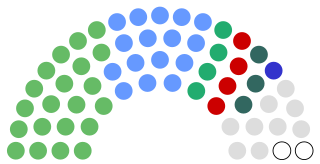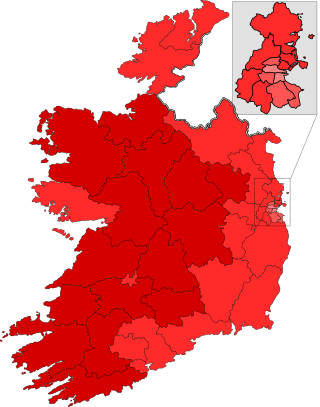
The Constitution of the Irish Free State was adopted by Act of Dáil Éireann sitting as a constituent assembly on 25 October 1922. In accordance with Article 83 of the Constitution, the Irish Free State Constitution Act 1922 of the British Parliament, which came into effect upon receiving the royal assent on 5 December 1922, provided that the Constitution would come into effect upon the issue of a Royal Proclamation, which was done on 6 December 1922. In 1937 the Constitution of the Irish Free State was replaced by the modern Constitution of Ireland following a referendum.
The Council of State is a body established by the Constitution of Ireland to advise the President of Ireland in the exercise of many of their discretionary, reserve powers. It also has authority to provide for the temporary exercise of the duties of the president if these cannot be exercised by either the president or the Presidential Commission.
The Ninth Amendment of the Constitution Act 1984 is an amendment to the Constitution of Ireland that allowed for the extension of the right to vote in elections to Dáil Éireann to non-Irish citizens. It was approved by referendum on 14 June 1984, the same day as the European Parliament election, and signed into law on 2 August of the same year.
The Sixteenth Amendment of the Constitution Act 1996 is an amendment of the Constitution of Ireland which provides that a court can refuse bail to a suspect where it feared that while at liberty they would commit a serious criminal offence. It was approved by referendum on 28 November 1996 and signed into law on 12 December of the same year.
Amendments to the Constitution of Ireland are only possible by way of referendum. A proposal to amend the Constitution of Ireland must be initiated as a bill in Dáil Éireann, be passed by both Houses of the Oireachtas (parliament), then submitted to a referendum, and finally signed into law by the president of Ireland. Since the constitution entered into force on 29 December 1937, there have been 32 amendments to the constitution.
An ordinary referendum in Ireland is a referendum on a bill other than a bill to amend the Constitution. The Constitution prescribes the process in Articles 27 and 47. Whereas a constitutional referendum is mandatory for a constitutional amendment bill, an ordinary referendum occurs only if the bill "contains a proposal of such national importance that the will of the people thereon ought to be ascertained". This is decided at the discretion of the President, after a petition by Oireachtas members including a majority of Senators. No such petition has ever been presented, and thus no ordinary referendum has ever been held.

The Fifteenth Amendment of the Constitution Act 1995 is an amendment of the Constitution of Ireland which removed the constitutional prohibition on divorce, and allowed for the dissolution of a marriage provided specified conditions were satisfied. It was approved by referendum on 24 November 1995 and signed into law on 17 June 1996.

The Third Amendment of the Constitution Bill 1958 was a proposal to amend the Constitution of Ireland to alter the electoral system from proportional representation under the single transferable vote (PR-STV) to first-past-the-post (FPTP). The proposal was rejected in a referendum held on 17 June 1959. This was the same date as the presidential election in which Taoiseach Éamon de Valera was elected as president.
Three referendums were held in Ireland on 25 November 1992, the same day as the 1992 general election. Each was on a proposed amendment of the Irish constitution relating to the law on abortion. They were enumerated as the Twelfth, Thirteenth and Fourteenth Amendments. The proposed Twelfth Amendment was rejected by voters while both the Thirteenth and Fourteenth were approved.
A Referendum Commission was an independent statutory body in Ireland which had been set up in advance of referendums in Ireland from 1998 to 2019. The Referendum Act 1998 as amended by the Referendum Act 2001 provided for the establishment of the body. It was superseded in 2023 by the Electoral Commission, established on a permanent basis.

Seanad Éireann is the senate of the Oireachtas, which also comprises the President of Ireland and Dáil Éireann.
The Twenty-ninth Amendment of the Constitution Act 2011 is an amendment to the Constitution of Ireland which relaxes the previous prohibition on the reduction of the salaries of Irish judges. It was approved by a referendum on 27 October 2011 signed into law on 17 November 2011. It was held on the same day as a referendum on Oireachtas Inquiries, which was rejected, and the presidential election at which Michael D. Higgins was elected.
The Thirtieth Amendment of the Constitution Bill 2011 was a proposed amendment to the Constitution of Ireland to provide for the Houses of the Oireachtas to conduct full inquiries. The bill was passed by both houses of the Oireachtas, but rejected at a referendum held on 27 October 2011.
The Convention on the Constitution was established in Ireland in 2012 to discuss proposed amendments to the Constitution of Ireland. More commonly called simply the Constitutional Convention, it met for the first time 1 December 2012 and sat until 31 March 2014. It had 100 members: a chairman; 29 members of the Oireachtas (parliament); four representatives of Northern Ireland political parties; and 66 randomly selected citizens of Ireland.
The Thirty-first Amendment of the Constitution (Children) Act 2012 amended the Constitution of Ireland by inserting clauses relating to children's rights and the right and duty of the state to take child protection measures. It was passed by both Houses of the Oireachtas (parliament) on 10 October 2012, and approved at a referendum on 10 November 2012, by 58% of voters on a turnout of 33.5%. Its enactment was delayed by a High Court case challenging the conduct of the referendum. The High Court's rejection of the challenge was confirmed by the Supreme Court on 24 April 2015. It was signed into law by the President on 28 April 2015.

The Thirty-second Amendment of the Constitution Bill 2013 was a proposal to amend the Constitution of Ireland to abolish Seanad Éireann, the upper house of the Irish parliament, the Oireachtas. The proposal was rejected by the electorate in a referendum on 4 October 2013 by 51.7% voting against to 48.3% in favour.
The Thirty-third Amendment of the Constitution Act 2013 is an amendment to the Constitution of Ireland which established a Court of Appeal to sit between the existing High and Supreme Courts for the purpose of taking over most of the appellate jurisdiction of the Supreme Court. The amendment was approved by the electorate in a referendum on 4 October 2013, and then signed into law by President Michael D. Higgins on 1 November 2013.

The Thirty-fifth Amendment of the Constitution Bill 2015 was a proposed amendment to the constitution of Ireland to reduce the minimum age of candidacy for the office of President of Ireland from 35 to 21. The bill was introduced to the Oireachtas in January 2015 by the Fine Gael–Labour government, after which both houses of the Oireachtas passed the bill. The bill was rejected by the electorate in a referendum on 22 May 2015 by 73.1% against to 26.9% in favour.

The Thirty-eighth Amendment of the Constitution of Ireland is an amendment to the Constitution of Ireland which altered the provisions regulating divorce. It removed the constitutional requirement for a defined period of separation before a Court may grant a dissolution of marriage, and eased restrictions on the recognition of foreign divorces. The amendment was effected by an act of the Oireachtas, the Thirty-eighth Amendment of the Constitution Act 2019.
Various proposals have been considered since the 1980s to extend the franchise in Irish presidential elections to citizens resident outside the state. In 2019, the then government introduced a bill to amend the constitution to facilitate this extension. The bill lapsed in January 2020 when the 32nd Dáil was dissolved for the 2020 general election, but was restored to the order paper in July 2020.






